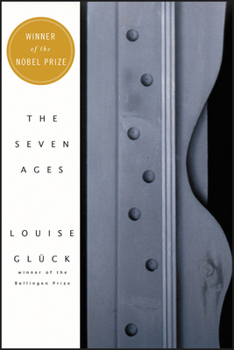The Seven Ages
Select Format
Select Condition 
Book Overview
Winner of the Nobel Prize in Literature The masterful collection from the acclaimed Pulitzer Prize-winning author of The Wild Iris and Vita Nova Louise Gl ck has long practiced poetry as a species of clairvoyance. She began as Cassandra, at a distance, in league with the immortal; to read her books sequentially is to chart the oracle's metamorphosis into unwilling vessel, reckless, mortal and crude...
Format:Paperback
Language:English
ISBN:0060933496
ISBN13:9780060933494
Release Date:March 2002
Publisher:Ecco Press
Length:80 Pages
Weight:0.35 lbs.
Dimensions:0.2" x 6.2" x 8.9"
Customer Reviews
5 ratings
brilliant, idiosyncratic
Published by Thriftbooks.com User , 21 years ago
Salient in this book is Louise Gluck's absolute brilliant mastery of every aspect of poetry. She said somewhere that this was her weirdest book yet. It's not among the most experimental poetry published today; it's unique great Louise Gluck. Every word in every poem feels like a monumental perfection.I hope this review has been helpful to you.
Jaguarian Grace
Published by Thriftbooks.com User , 21 years ago
I recently saw a review of Louise Glück's "The Seven Ages." With a kind of innocent wantonness, the reviewer dismissed the worthiness of Gluck's collective output, and flatly declared the book to be without idea, philosophy, pleasure.In a perfect world, people would be shot for less, and organ procurement teams notified.Glück strips. She prefers elemental language---hers is a hard-body and athletic poetry---but her sparsity never short-changes emotional impact, borealistic or far subtler. To wit, from "Youth;""My sister and I at two ends of the sofa,reading (I suppose) English novels.The television on; various schoolbooks open,or places marked with sheets of lined paper.Euclid, Pythagoras. As though we had looked intothe origin of thought and preferred novels."Her subject matter, if not the whole of the world and us in it, frequently takes the form of love---real love, passionate love, the opiate kind come riding zephyrs, powerful enough to border hystericism, such is its biological power. This focus also includes at times the unhappy aftermath, such as is found in "The Balcony":"It was a night like this, at the end of summer.We had rented, I remember, a room with a balcony.How many days and nights? Five, perhaps-no more.Even when we weren't touching we were making love.We stood on our little balcony in the summer night.And off somewhere, the sounds of human life.We were the soon to be anointed monarchs,well disposed to our subjects. Just beneath us,sounds of a radio playing, an aria we didn't in those years know.Someone dying of love. Someone from whom time had takenthe only happiness, who was alone now,impoverished, without beauty.The rapturous notes of an unendurable grief, of isolation and terror,the nearly impossible to sustain slow phrases of the ascending figures-they drifted out over the dark waterlike an ecstasy.Such a small mistake. And many years later,the only thing left of that night, of the hours in that room."We get the whole of it: the event experienced, the event witnessed, the event's ramifications as prophecy, and finally the unretainable ecstasy and brutal wisdom of the high-country moment, returned to everyday living, so far as possible. Contrary to unpopular opinion, Glück's latest work makes the most of idea and philosophy and pleasure, embodied in its paced and quiet understatement, signifying its origins in the truly genuine. The Seven Ages rings with the sharp strike of the authentic, rarely sinking into the echoes of sentimentality.Really, is another round of balloting necessary to induct Glück into a mythical poetry hall of fame? This one goes on the first ballot.Read the book. More ripe delights await.
Like going to church.
Published by Thriftbooks.com User , 22 years ago
Louise Gluck has quietly become one of our greatest poets, building an impressive, meticulous body of work since the mid-1970s. The fact that she's also a winner of just about every major poetry award, pales in comparison to the naked searching, the brave confrontations, and the hard-won, deeply resonant wisdom her poems uncover. Deceptively simple, Gluck's diamond-cut lines encompass a vocabulary refined to the simplest -- purest -- of objects and emotions, that when repeated gain a kind of elusive, opaque mystery. Whether the subject is herself, her older sister, her lovers, time, memory, desire, or death, the cumulative effect is nearly catechismal -- and, indeed, reading Gluck is like going to church.
a collection of poetry of the personal with universal appeal
Published by Thriftbooks.com User , 23 years ago
Louise Gluck's latest collection of poems reveal a new cadence to her voice.There is a directness of speech and lack of opacity which is new to her work.The poems as previously in her work inhabit the world of the reflective thoughtful person sighing in the noisy world .Memories and feelings for the past ,present and future beg to have sense made of them.I was struck by the description of seemingly endless days spent in her childhood on Long Island where time almost began to cease to exist.This is an excellent book don't miss it.
Lovely!
Published by Thriftbooks.com User , 23 years ago
Louise Gluck never backs off--she takes risks. Rather than stay on the safe, "winner's" path, she veers, speeds, slows down, makes the curves--each book a little different, each focus a new one. Louis Gluck brings something delicious and new to the table each time. Her fearlessness is exciting!






